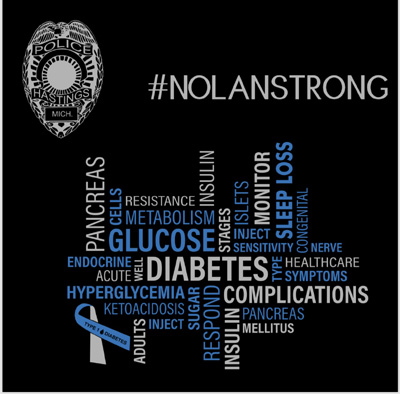 Cops vs. Teachers is a charity basketball game to benefit the Juvenile Diabetes Research Foundation helping to find a cure for the childhood disease, Type 1 diabetes.
Cops vs. Teachers is a charity basketball game to benefit the Juvenile Diabetes Research Foundation helping to find a cure for the childhood disease, Type 1 diabetes.
It’s a fun evening with a serious purpose, the Hastings Area School System teacher’s team will play their hardest against area law enforcement, sponsored by the Hastings Police Department.
Cost at the door on Wednesday, April 10 is $5, tee-shirts are $17 and will be on sale to raise more for the cause.
Doors open at 5 p.m., tip-off is at 6 p.m. at Hastings High School, 520 West South Street in Hastings. All proceeds will be donated to Juvenile Diabetes Research Foundation in honor of Nolan Lucas.
Nolan is an eight-year-old, third-grade student in Brynlee Carlton’s room at Star Elementary. Nolan smiles a lot and is very soft spoken. He wants to be a Paleontologist when he grows up - he has loved dinosaurs since he was a toddler.
Honoring Nolan and raising money for the JDRF at the third annual charity Cops vs. Teachers game was suggested by Star School Counselor Megan VanWyk.
Nolan was diagnosed with Type 1 Diabetes when he was six years old. It’s a chronic condition in which the pancreas produces little or no insulin, a hormone needed to allow sugar to enter cells to produce energy, Nolan and many like him, need help to raise fund to find a cure.
Leah and Nick Lucas also have a daughter, Addison, 5. Nolan is excited, but a little shy about the attention he is getting, but “he can handle it,” Mom says. Leah is a social worker at Central Elementary and Nick is fleet mechanic at the Pepsi Company.
Central and Star Elementary are holding “penny wars" to help Nolan raise money. The class in each school that raises the most pennies will win a pizza party with Hastings Police Sgt. Kris Miller.
Nolan eyes light up at the idea of a pizza party, he’d like to win that. He’s not sure if he will play any basketball at the benefit game, or if he will be in the tip off, though Miller says he might be.
The funds collected from sponsors, tee-shirt sales, donations and the gate at the door will be presented at the conclusion of the game to JDRF team member Jillian Breneman by the Lucas family.
“JDRF works tirelessly to find better treatments, preventions and ultimately, a cure for type 1 diabetes (T1D) and its complications through critical research. Every dollar we are able to direct toward this research comes from donors. Your generosity fuels real progress toward a world without T1D,” its website says.
Leah explianed how they discovered that Nolan had diabetes.
"He lost weight very quickly, was excessively drinking water, needing to use the restroom excessively, having severe mood swings, and just wasn't himself.
"We were lucky enough that I realized something was amiss early and he was not in full blown Diabetic Ketoacidosis by the time we went to the hospital in November 2016. Helen DeVos hospital has been a huge support and took the time to teach us how to take care of our sweet boy!
"My advice to other parents is to trust your gut - pediatricians do not check for diabetes unless you ask."
The win-loss record in the Cops vs Teachers contests is 0-2 with the teachers holding the winning record. “We’re hoping this is the year,” Miller said.//
Sponsors so far include Total Health Center, Spencer’s Towing, Edward Jones, the Coves, FlexFab Inc., M-43 Auto, Priority Collision, Miller Real Estate, Detail Dr. and Laser Wash, Tripp & Tagg Law Offices, Bradley Ortega & Family, Thornapple Credit Union, Southside Pediatrics, BailTek, Pepsi Grand Rapids, Bellabay Realtors-KellyBrown. 
Diabetes can’t be cured, but it can be managed, according to the following information from the Mayo Clinic. Type 1 diabetes in children is a condition in which your child's body no longer produces an important hormone (insulin). Type 1 diabetes in children used to be known as juvenile diabetes or insulin-dependent diabetes.
The diagnosis of type 1 diabetes in children can be overwhelming at first. Suddenly you and your child — depending on his or her age — must learn how to give injections, count carbohydrates and monitor blood sugar. Type 1 diabetes in children requires consistent care, but advances in blood sugar monitoring and insulin delivery have improved the daily management of the condition.
The exact cause of type 1 diabetes is unknown, but in most people with the disease, the body's immune system, which normally fights harmful bacteria and viruses, mistakenly destroys insulin-producing (islet) cells in the pancreas. Genetics and environmental factors appear to play a role in the process.
Insulin performs the critical job of moving sugar (glucose) from the bloodstream to the body's cells. Sugar enters the bloodstream when food is digested. Once the islet cells of the pancreas are destroyed, your child produces little or no insulin. As a result, glucose builds up in your child's bloodstream, where it can cause life-threatening complications.
While there's nothing you could have done to prevent your child's type 1 diabetes, you can help your child prevent its complications by helping your child maintain good blood sugar control as much as possible.
Teach your child the importance of eating a healthy diet and getting regular physical activity and schedule regular visits with your child's diabetes doctor and a yearly eye exam beginning no more than five years after the initial diabetes diagnosis
The signs and symptoms of type 1 diabetes in children usually develop quickly, over a period of weeks. Extreme hunger and unexplained weight loss is often the first sign of type 1 diabetes to be noticed in children. Other symptoms include increased thirst and frequent urination, fatigue, irritability or behavior changes, fruity-smelling breath, blurred vision, and yeast infection in girls.
See your child's doctor if you notice any of the signs or symptoms of type 1 diabetes.
Complications of type 1 diabetes develop gradually. If blood sugar levels aren't well-controlled over a prolonged period of time, diabetes complications can eventually be disabling or even life-threatening.
Complications can include heart and blood vessel disease later in life, nerve damage especially in child legs, which usually happens gradually over a long period of time, kidney damage, eye damage, skin conditions and osteoporosis as an adult.
The Lucas family, dad Nick, mom Leah and children Addison and Lucas at the Hastings Police Department.














